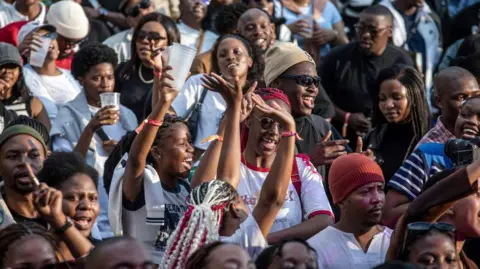 Reply to Mahabala
Reply to MahabalaSouth Africa’s social media influencers, popular among young people, have taken on a new role as political mobilizers ahead of this week’s election.
With 42% of registered voters under the age of 40, the younger generation is likely to play an important role in Wednesday’s election.
Amid videos of jokes about power outages and relationships, TikTok creator Karabo “Kay” Mahapa, who has more than 350,000 followers, deviated from his usual content to tell people to get out and vote .
The messages target young voters, who a recent survey found are pessimistic about the country’s future
A recurring question in Mahapa’s election-themed film is “Who do we vote for?” – reflecting the uncertainty of a generation.
“I just want to emphasize the importance of voting,” he told the BBC.
While Mahapa has never explicitly told his followers which party they should place the cross next to, he has made it clear which party he will not vote for.
In one of his videos, which has been viewed more than 1.7 million times, he sincerely asked people if they would agree not to support the ruling African National Congress (ANC).
It’s impossible to know how many of them would agree with Mahapa, but if the polls are correct, the ANC could lose its absolute majority in parliament for the first time since the end of white minority rule in 1994.
The party has been embattled in recent years by accusations of corruption and economic mismanagement after three decades in power.
Under Mahapa’s video, one person commented: “We don’t know who we have to vote for in the ANC though. We are tired of this toxic relationship with them.
On the other hand, there was not much enthusiasm for the main opposition Democratic Alliance in the comments section.
South Africa’s influencer industry has moved beyond the stereotype of selling perfumes, restaurants and clothing brands. It now includes debating and promoting ideas and political philosophy.
Ronel Gerber, managing director of Johannesburg-based marketing agency FGX studios, told the BBC that marketing spend on employing influencers has increased by 78% in the past three years.
“Influencers are the new word of mouth,” she said.
Beauty influencer Kay Yarms, who has more than 500,000 followers on Instagram, put the initiative into action in February when she used her platform Get her followers to register to vote.
The social media star posted a link to a new YouTube video on her Instagram Story, but instead of new content, it redirected people to a voter registration website.
One user said she wouldn’t have signed up if it weren’t for the beauty guru.
Asithandile Mayongo, a 22-year-old Rhodes University student, said information on social media prompted him to pay more attention to the election, especially as a first-time voter.
“Social media has provided me with ample resources to help me understand voting, the electoral process and political issues,” he told the BBC.
Other influencers have also used comedy to spark discussion and drive people to the polls.
A video about election promises made by comedian Bouwer Bosch, 40, has been viewed more than 2 million times.
In the post, he poked fun at the current administration and the problems plaguing the country.
It’s a humorous take on the current situation in South Africa and a way to push people to take action.
“Comedy is like medicine,” he told the BBC, hoping it would start conversations and encourage people to get more involved in politics.
“I want to show people where we are right now and let them make an informed decision for themselves,” the comedian said.
Political parties are also taking note of this newfound influence.
Mahapra said he was approached by a political party to encourage his followers to work in their direction, but he declined. He did not reveal which one.
He told the BBC that many influential people, large and small, had been approached and paid by political parties to promote their propaganda.
Ms Gerber confirmed this was common practice.
Mahapa doesn’t judge content creators who take money because he believes South Africa’s current economic situation – with unemployment approaching 33% – has driven many people into despair.
 Getty Images
Getty ImagesHowever, the phenomenon of parties buying influence through content creators scares him.
Mahapra therefore sought to leverage the power of social media to engage his audience in the election.
“I call it edutainment — educating and informing people,” he said.
It’s this type of entertaining content that Fay Williams, a 35-year-old Johannesburg resident, watches on TikTok.
Ms. Williams said influencers she tracks include Samantha Jansen, who has about 265,000 TikTok followers, and Darren Campher, who has 128,000 TikTok followers. All talking about the political situation in South Africa.
“They present facts and share their insights to help inform the audience,” she said.
She told the BBC that while social media did not influence her vote, it did “make me aware of my party selection process”.
While some influencers have taken on the daunting task of spreading the word about each party’s manifesto, Ms Williams said people had to do their own research.
“Influencers play a role in this education by promoting critical thinking, which is why people are eager to follow those who can stimulate thoughtful discussion,” she said.
Mahapa said influential people should use their power responsibly, but acknowledged that voting alone would not solve all of South Africa’s problems.
Still, he’s proud of the role he played in getting people to the ballot box.

More information on South Africa’s 2024 elections:
 Getty Images/BBC
Getty Images/BBC

